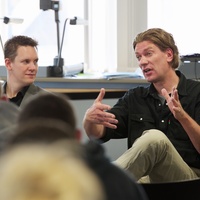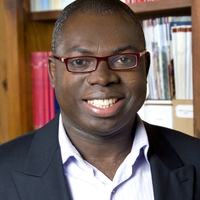
Hartmut Behr
Related Authors
Benjamin Martill
University of Edinburgh
Thomas Tieku
King's University College at Western University
Asaf Siniver
University of Birmingham
Giovanni Agostinis
Università di Bologna
Lisbeth Zimmermann
Zeppelin University
Matthew D Stephen
Wissenschaftszentrum Berlin für Sozialforschung - WZB
Stefano Guzzini
European University Institute
Jean-Frederic Morin
Université Laval
Laura Gomez Mera
University of Miami
InterestsView All (6)










Uploads
Papers by Hartmut Behr
succession of theories or “isms” that are connected to academic schools. Echoing the increasing criticism of this narrative, we present in this article a new perspective on the discipline. We introduce concepts from linguistics and its method of digital discourse analysis (DDA) to explore discursive shifts and terminological entrepreneurship in IR. DDA directs
attention away from schools of thought and “heroic figures” who allegedly
invented new theories. As we show exemplarily with the rise of “regime
theory,” there were entire generations of IR scholars who (more or less
consciously) developed new vocabularies to frame and address their common concerns. The terminological history of “international regime” starts in nineteenth century international law, in which French authors already used “régime” to describe transnational forms of governance that were more than a treaty but less than an international organization. Only in the 1980s, however, was an explicit definition of “international regime” forged in American IR, which combined textual elements already in use. We submit that such observations can change the way in which we understand, narrate, and teach the discipline of IR. DDA decenters IR theory from its traditional focus on schools and individuals and suggests unlearning established taxonomies of “isms.” The introduction of corpus linguistic methods to the study of academic IR can thus provide new epistemological directions for the field.
succession of theories or “isms” that are connected to academic schools. Echoing the increasing criticism of this narrative, we present in this article a new perspective on the discipline. We introduce concepts from linguistics and its method of digital discourse analysis (DDA) to explore discursive shifts and terminological entrepreneurship in IR. DDA directs
attention away from schools of thought and “heroic figures” who allegedly
invented new theories. As we show exemplarily with the rise of “regime
theory,” there were entire generations of IR scholars who (more or less
consciously) developed new vocabularies to frame and address their common concerns. The terminological history of “international regime” starts in nineteenth century international law, in which French authors already used “régime” to describe transnational forms of governance that were more than a treaty but less than an international organization. Only in the 1980s, however, was an explicit definition of “international regime” forged in American IR, which combined textual elements already in use. We submit that such observations can change the way in which we understand, narrate, and teach the discipline of IR. DDA decenters IR theory from its traditional focus on schools and individuals and suggests unlearning established taxonomies of “isms.” The introduction of corpus linguistic methods to the study of academic IR can thus provide new epistemological directions for the field.
politics and also in peace and conflict studies. Yet, approaches to
understanding or incorporating issues of difference into the analysis of
international order have often tended to come to rest on essentialising
notions of ethnicity or other forms of identity, which also are relegated
to a state of lesser importance than westernised notions of secular citizenship,
cosmopolitan toleration, and free-flowing capital. This important
book engages with the difficult and necessary task of envisioning
peace-with-difference in international politics. Without advances in this
area, as Professor Behr outlines, difference is destined to undermine
order when instead it might be constitutive of peace.”
Prof. Oliver Richmond, University of Manchester, UK
“Hartmut Behr makes a significant contribution to our understanding of
the fundamental problems centering around our conventional concept
of peace. With the help of phenomenological, anti-essentialist thinkers,
he reveals that the concept of peace, as deployed in the Western tradition
of political and philosophical thought as well as in international
politics, is a hegemonic and imperial concept that suppresses and assimilates
difference, thus effacing otherness for the sake of the self. He eloquently
invites us on a thrilling but serious journey towards reconceptualizing a
non-hegemonic peace that is hospitable to difference.”
Takashi Kibe, Professor of Political Theory and Director of the Peace
Research Institute, International Christian University, Tokyo, Japan
“Philosophically grounded, Politics of Difference not only produces one
of the most compelling critiques of ‘imperial peace’ and its genealogies,
but offers with sustained intellectual vigour an original discourse on the
ontology of our times. It is truly a tour de force.”
Mustapha Kamal Pasha, Chair in International Politics,
Aberystwyth University, UK
Timothy W. Luke, University Distinguished Professor of Political Science, Virginia Polytechnic Institute and State University, USA
Taking the relationship between universalism and particularism as his starting point, Behr provides a panoramic historical vision of international political theory. In its attempt to reconstruct a philosophical genealogy of war and peace, and a renewed ethics, this original and remarkably wide-ranging book is as challenging as it is ambitious: it deserves widespread attention across International Relations and beyond.
Professor Michael C Williams, Graduate School of Public and International Affairs, University of Ottawa
Political ( La notion du “politique” et la théorie des différends internationaux) from 1933 is, therefore, the first endeavor to make his European writings more accessible to students of International Relations, particularly of the English-speaking academia, by presenting a translation of his original French text.